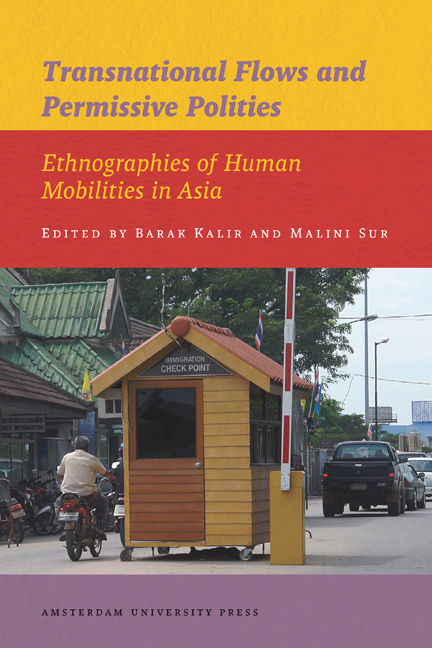Book contents
- Frontmatter
- Contents
- List of Tables, Maps, Figures and Photographs
- Acknowledgements
- Introduction: Mobile Practices and Regimes of Permissiveness
- 1 Illegality Rules: Chinese Migrant Workers Caught up in the Illegal but Licit Operations of Labour Migration Regimes
- 2 Contesting the State of Exception in the Afghan-Pakistani Marchlands
- 3 ‘Looking for a Life’: Rohingya Refugee Migration in the Post-Imperial Age
- 4 Smuggling Cultures in the Indonesia-Singapore Borderlands
- 5 Trade, Transnationalism and Ethnic Infighting: Borders of Authority in Northeast Borneo
- 6 Bamboo Baskets and Barricades: Gendered Landscapes at the India-Bangladesh Border
- 7 Moving between Kerala and Dubai: Women Domestic Workers, State Actors and the Misrecognition of Problems
- 8 Emigration of Female Domestic Workers from Kerala: Gender, State Policy and the Politics of Movement
- 9 Mainland Chinese Migrants in Taiwan, 1895-1945: The Drawbacks of Being Legal
- 10 ‘Playing Edge Ball’: Transnational Migration Brokerage in China
- Epilogue: Irregular Mobilities and Disjunctive Moralities
- About the Editors and Contributors
- Bibliography
- Index
- Publications Series
8 - Emigration of Female Domestic Workers from Kerala: Gender, State Policy and the Politics of Movement
Published online by Cambridge University Press: 15 January 2021
- Frontmatter
- Contents
- List of Tables, Maps, Figures and Photographs
- Acknowledgements
- Introduction: Mobile Practices and Regimes of Permissiveness
- 1 Illegality Rules: Chinese Migrant Workers Caught up in the Illegal but Licit Operations of Labour Migration Regimes
- 2 Contesting the State of Exception in the Afghan-Pakistani Marchlands
- 3 ‘Looking for a Life’: Rohingya Refugee Migration in the Post-Imperial Age
- 4 Smuggling Cultures in the Indonesia-Singapore Borderlands
- 5 Trade, Transnationalism and Ethnic Infighting: Borders of Authority in Northeast Borneo
- 6 Bamboo Baskets and Barricades: Gendered Landscapes at the India-Bangladesh Border
- 7 Moving between Kerala and Dubai: Women Domestic Workers, State Actors and the Misrecognition of Problems
- 8 Emigration of Female Domestic Workers from Kerala: Gender, State Policy and the Politics of Movement
- 9 Mainland Chinese Migrants in Taiwan, 1895-1945: The Drawbacks of Being Legal
- 10 ‘Playing Edge Ball’: Transnational Migration Brokerage in China
- Epilogue: Irregular Mobilities and Disjunctive Moralities
- About the Editors and Contributors
- Bibliography
- Index
- Publications Series
Summary
In January 2006, at a workshop on Social Protection of Migrant Workers at the Centre for Development Studies (CDS) in Trivandrum, a senior scholar of international migration recommended a total ban on the movement of women domestic workers to the Gulf region, citing extremely harsh working conditions. This was in accordance with the strong sentiment at the workshop that the severe exploitation of women migrant domestic workers warranted measures to control their movement. Puzzled by this course of reasoning, a middle-aged woman – a teacher from a local college – pointed out that women emigrate as domestic workers because they need work with relatively better returns than is available at home and not because they expect a life of comfort in the host country. Why then should poor women be prevented from seeking work abroad? Responding to this, a trade union representative cited an International Labour Organization survey which, according to him, had found that over 60 per cent of women domestic workers in the Middle East experienced sexual abuse. Were these appropriate conditions for women to seek work in? The question virtually silenced middle- ground voices such as that of the teacher by turning the issue into one of female sexual security and, as a result, one of morality. The workshop had already encountered the thin dividing line between migration for domestic work and illegal recruitment and trafficking, an issue that had served to mobilise opinion in favour of controls. This restrictive perspective on women's mobility is underscored also by Pattadath and Moors’ research (in Chapter 7).
Government of India's restrictions on the emigration of women in ‘unskilled’ categories such as domestic work are framed as measures intended to protect women from exploitation. State protectionism of women is held together by a social framework that constitutes marriage as the principal axis of a woman's identity. Marriage is expected to protect women, and mobility outside it (by single women or without the husband) is perceived as potentially transgressive. This protectionism is elaborated through gendered conceptions of citizenship and sovereignty and is implicated also in the approach adopted by an influential strand of scholarship on international migration from Kerala.
- Type
- Chapter
- Information
- Transnational Flows and Permissive PolitiesEthnographies of Human Mobilities in Asia, pp. 169 - 188Publisher: Amsterdam University PressPrint publication year: 2012

